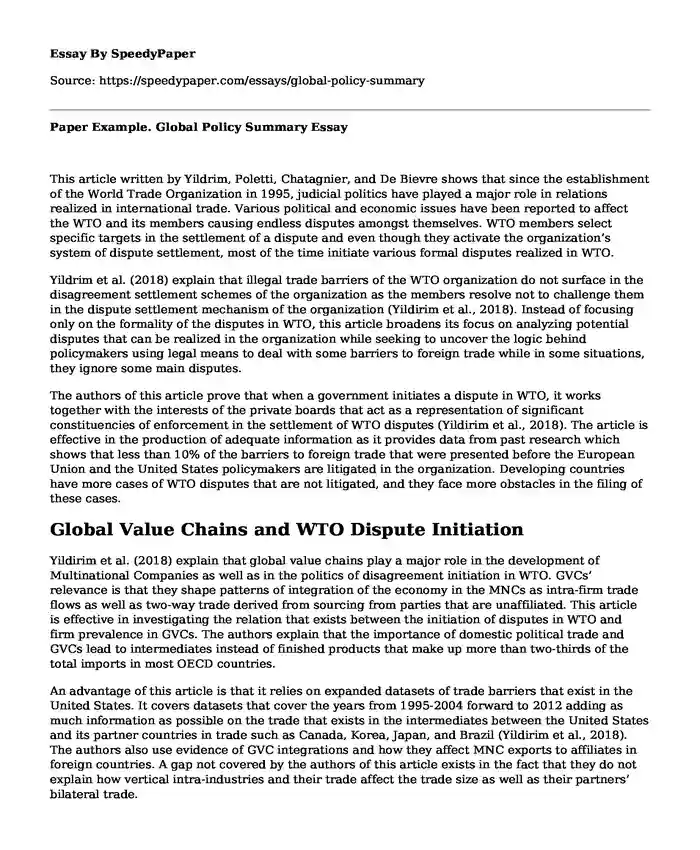
| Type of paper: | Essay |
| Categories: | Globalization Macroeconomics International relations |
| Pages: | 3 |
| Wordcount: | 682 words |
This article written by Yildrim, Poletti, Chatagnier, and De Bievre shows that since the establishment of the World Trade Organization in 1995, judicial politics have played a major role in relations realized in international trade. Various political and economic issues have been reported to affect the WTO and its members causing endless disputes amongst themselves. WTO members select specific targets in the settlement of a dispute and even though they activate the organization’s system of dispute settlement, most of the time initiate various formal disputes realized in WTO.
Yildrim et al. (2018) explain that illegal trade barriers of the WTO organization do not surface in the disagreement settlement schemes of the organization as the members resolve not to challenge them in the dispute settlement mechanism of the organization (Yildirim et al., 2018). Instead of focusing only on the formality of the disputes in WTO, this article broadens its focus on analyzing potential disputes that can be realized in the organization while seeking to uncover the logic behind policymakers using legal means to deal with some barriers to foreign trade while in some situations, they ignore some main disputes.
The authors of this article prove that when a government initiates a dispute in WTO, it works together with the interests of the private boards that act as a representation of significant constituencies of enforcement in the settlement of WTO disputes (Yildirim et al., 2018). The article is effective in the production of adequate information as it provides data from past research which shows that less than 10% of the barriers to foreign trade that were presented before the European Union and the United States policymakers are litigated in the organization. Developing countries have more cases of WTO disputes that are not litigated, and they face more obstacles in the filing of these cases.
Global Value Chains and WTO Dispute Initiation
Yildirim et al. (2018) explain that global value chains play a major role in the development of Multinational Companies as well as in the politics of disagreement initiation in WTO. GVCs’ relevance is that they shape patterns of integration of the economy in the MNCs as intra-firm trade flows as well as two-way trade derived from sourcing from parties that are unaffiliated. This article is effective in investigating the relation that exists between the initiation of disputes in WTO and firm prevalence in GVCs. The authors explain that the importance of domestic political trade and GVCs lead to intermediates instead of finished products that make up more than two-thirds of the total imports in most OECD countries.
An advantage of this article is that it relies on expanded datasets of trade barriers that exist in the United States. It covers datasets that cover the years from 1995-2004 forward to 2012 adding as much information as possible on the trade that exists in the intermediates between the United States and its partner countries in trade such as Canada, Korea, Japan, and Brazil (Yildirim et al., 2018). The authors also use evidence of GVC integrations and how they affect MNC exports to affiliates in foreign countries. A gap not covered by the authors of this article exists in the fact that they do not explain how vertical intra-industries and their trade affect the trade size as well as their partners’ bilateral trade.
Conclusion
This article is successful in investigating the relationship that exists between dispute initiation in WTO and the way that sectors and firms prevail in the integration of global value chain trades. The findings that the authors show in the article have effective implications in the explanation of how GVCs affect stability, legitimacy and functions of other international institutions around the world. Despite the decline of the negotiation forum for both new and liberalized commitments, the dispute settlement used in WTO continues to deal with the interests of activities related to trade and the tackling of trade barriers in foreign countries.
Reference
Yildirim, A. B., Poletti, A., Chatagnier, J. T., & De Bièvre, D. (2018). The globalization of production and the politics of dispute initiation at the World Trade Organization. Global Policy, 9, 38-48. https://onlinelibrary.wiley.com/doi/pdf/10.1111/1758-5899.12615
Cite this page
Paper Example. Global Policy Summary. (2023, Aug 16). Retrieved from https://speedypaper.net/essays/global-policy-summary
Request Removal
If you are the original author of this essay and no longer wish to have it published on the SpeedyPaper website, please click below to request its removal:
- Free Essay on Developing a Sustainable City Model for Port Louis
- Free Essay on Globalization: Assessment of International Industry Cooperation
- Finance Essay Sample for Free: Evaluate Pay Equity
- Essay Example: Unemployment as a Social Issue Affecting the Quality of Life in Jamaica
- Free Essay about Contemporary Business Communication in a Globalized World
- The Likelihood of a Potential Future Conflict Between the United States and China - Free Essay
- Essay Sample on Human Resources Strategy Project
Popular categories




